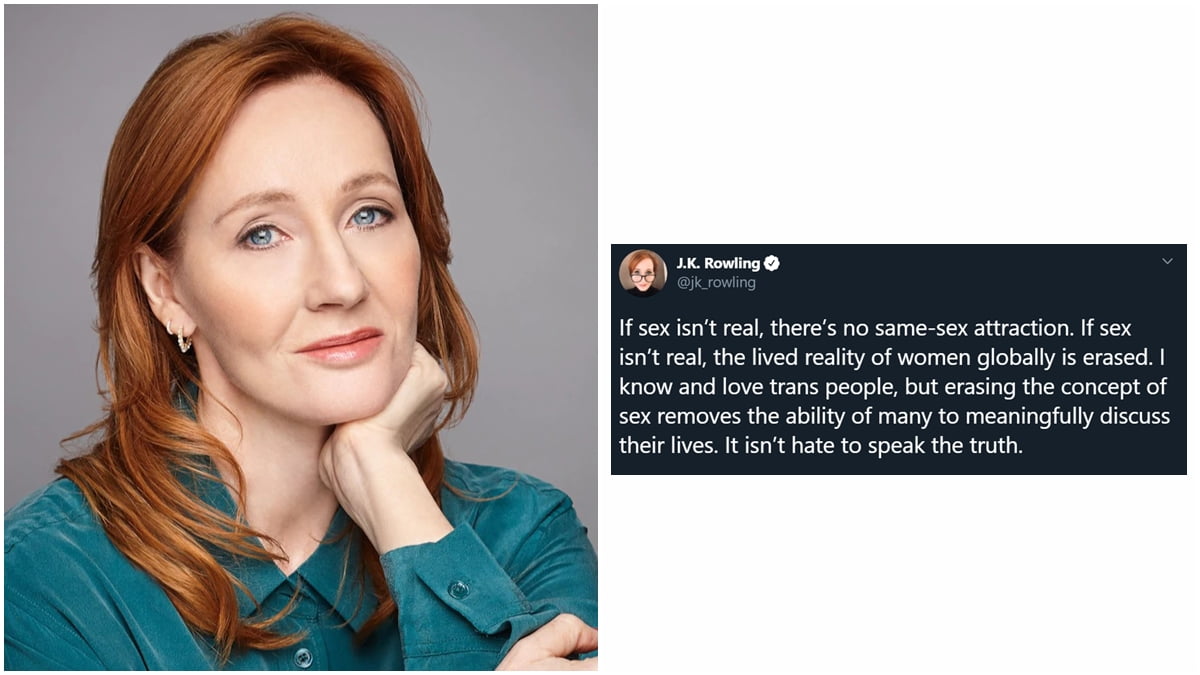Joanne Kathleen Rowling is many things to many people – most of them lovely. She is, and has been, many things to me as well – a gateway into the vast, wonderful and utterly bonkers world of fantasy and speculative fiction, a motivational story in and of herself, a liberal, a feminist, a vocal anti-Brexit advocate, and so much more. Rowling has spoken out against fascism, nazism, nationalist isolation, racism, and misogyny and has self-identified as an LGBT+ ally herself, if not a member – which her recent essay may have alluded to, however obliquely.
Which is perhaps why, when hints of transphobia began to appear on J.K. Rowling’s social media accounts back in 2018, the universe and fanverse were quick to rush to her defence and accept that she had just had a “middle-aged moment”. As was I. It took a friend to explain to me that her tweet in solidarity of Maya Forstater was transphobic when I liked it, without reading it all the way through. It’s also why, Rowling’s recent clarification of her views on sex, gender, sexual orientation and gender identity in a long essay on her website were horrifying. But, and let me be clear about this – Rowling’s views are (a) incorrect and (b) just that – views.
Rowling’s recent clarification of her views on sex, gender, sexual orientation and gender identity in a long essay on her website were horrifying. But, and let me be clear about this – Rowling’s views are (a) incorrect and (b) just that – views.
As the rest of the feminist movement, activists and allies were celebrating the Pride Month this year, Rowling decided to go on a Twitter rampage attempting to explain why transgender feminism could hurt lesbians and women. This earned her the tag of TERF or Trans Exclusionary Radical Feminist, which she did not alienate herself from, outrightly. On June 28, when Rowling spoke up against allegations that she was using her experiences of sexual assault and domestic violence to discriminate against the trans community, Stephen King lend his support to her, which she praised and said a thank you for. However, when King, in response to another Twitter user categorically said that “Trans women are women“, not only did Rowling delete her tweet to King, she also unfollowed him. Almost as if, she was more focused on being anti-trans than being pro-women.
Also read: An Open Letter To J.K. Rowling On Casting Johnny Depp As Grindelwald
Sex Is A Spectrum, Not A Water-Tight Set Of Male-Female Compartments
I speak here as a doctor and a mental health professional, both. Sex doesn’t, unfortunately, fall into water-tight compartments. There is a lovely article by Nature magazine that I would recommend reading to understand this better.
The long and short of it is that sex is real, yes, just like other biological attributes. However, it lies on a spectrum with many, many diverse areas, just like its social counterpart – gender. The development of one’s biological sex depends on a complex set of signals between genes, epigenetics and hormones that occur in early development. It is not defined by something as simple as the sex chromosomes (the traditional complement of XX and XY) or by one’s external genitalia. Indeed, most people probably carry a mixture of signals and the physical attributes we see are probably just the dominant biological signals in the body.
It is a long and complex hypothesis, and probably means that biologists and doctors and lawmakers all over the world have probably got things wrong over millennia. If so, it would hardly be the first time. Remember when we thought the earth was flat, or that the sun revolved around the earth, or that the bumps on one’s skull determined personality and intelligence or that homosexuality was a disease?
The WHO defined sex in 2002 as the biological characteristics that define humans as female or male. It goes on to note – while these sets of biological characteristics are not mutually exclusive, as there are individuals who possess both, they tend to differentiate humans as males and female. As things go, it might be time to junk this and come up with a more complex and nuanced understanding of our bodies.
Gender And Orientation Clearly Lie On A Spectrum, Too
Whatever the biological attributes we are born with and who we identify as – man, woman, gender queer, gender fluid, gender non-conforming and so on – is clearly ours and ours alone to decide. As are how we characterise our orientation. Neither is fixed, but is a shifting, changing landscape which we navigate over our lives and may change over time.
This is completely alright too – our appearance, handwriting and favourite ice-cream flavour (pun absolutely, completely intended) change over time. Would it really be so surprising if who we see in the mirror and whom we choose to be attracted to or fall in love with could change too?
Psychiatry and Victorian morality have much to apologise for here. We did believe start off by believing quite fervently that anything apart from cis gender heterosexuality was a sexual perversion. Gay and trans conversion therapies are unfortunately still legal in many democracies –including India (Baba Ramdev offers them, for context).
This is also wrong. As another study last year showed – there is no gay gene. Just as there is no single sex gene, there is no single orientation gene either. This is, like our height, weight, skin colour, hair texture and so on – just another complex set of interactions between nature and nurture.
Also read: Why Are Trans Women Missing In The Advertising Industry?
Why Do These Spectrums Scare People?
Human beings are simplistic. We like our world divided into binary categories – 0s and 1s, North and South, right and wrong, male and female, straight and gay, virgins and whores. Shades of grey and ambiguity worry us. They mean that we can be less sure of the world around us, and this might be more of a threat and challenge to us than we would want. Anxiety is understandable – it is okay to be scared of complexity and change, all of us are.
J K Rowling is, as she disclosed, a survivor of abuse and violence and has struggled (and probably still does) with the ideas of sex and gender. The trauma is heart-breaking. However, it doesn’t justify acting as the gatekeeper to another person’s gender identity in reaction to a perceived threat to one’s safety.
What is not okay however, is using our fears and need for control to define other people’s identity. That is where J K Rowling erred. She is, as she disclosed, a survivor of abuse and violence and has struggled (and probably still does) with the ideas of sex and gender. The trauma is heart-breaking. However, it doesn’t justify acting as the gatekeeper to another person’s gender identity in reaction to a perceived threat to one’s safety. This is as fallacious as assuming the trauma narratives most fictional antagonists have to justify their cruelty. Queer love probably worried J.K Rowling too, which is perhaps why the Dumbledore brothers had to live lives as celibate recluses and eccentrics – a price to pay for non-conformist love.
It also does not justify assuming every trans man or trans woman wanting to use a gender affirming bathroom (a right, not a privilege) is a potential abuser or rapist – which is what much of the apprehensions about the safety of bathrooms tend to imply. If one’s gender identity is one’s own, the bathrooms one chooses to use must also be one’s own. And bathrooms must be safe spaces and accessible to everyone entitled to it, or it is safe for nobody.
Life Imitating Art
Not too far away from the wizarding world, India is also in the particularly problematic position of having named doctors and magistrates as gatekeepers to gender identity in the Transgender Persons (Protection of Rights) Act, 2019 – a step back for trans rights, not forward. Nobody, not even my professional body should be the gatekeepers to sexual orientation and gender identity, though everyone can be an ally in gender-affirmation in various capacities.
Lawyers and queer activists – Guruswamy and Katju have launched the Marriage Project – a legal project that aims to legalise LGBTQ+ marriage in India. This is a lovely initiative and intensely heartening. However, this has been put across as same-sex marriage – which is problematic for many gender non-conformists. They are right, India is a marriage country. However, marriage might not fall into the dichotomy of different-sex versus same-sex marriage though. We might not want it to.
What of our bathrooms? The Swachh Bharat Mission aims to achieve universal sanitation coverage in India – another lovely initiative. Perhaps another step forward could be gender-affirmative bathrooms, too.
J.K. Rowling has been, in her way, an important person to many of us, growing up. The Harry Potter universe provided a moral compass and helped many people come out. Which is why her fall from grace is devastating and feels like a personal loss. That it occurred during Pride Month is heartbreaking. I’m hoping though, that she will find a way to heal and to acceptance – of herself and others. Not because we need it, but because I suspect, she needs it.
About the author(s)
Migita is a psychiatrist, currently training as a resident doctor in geriatric psychiatry. She is originally from Kollam, Kerala. She grew up and did her schooling in Dubai, before relocating to India to pursue a career in Medicine. She completed her MBBS from Government Stanley Medical College in Chennai and her MD in Psychiatry from at the National Institute of Mental Health and Neurosciences, Bangalore. You can find her on Facebook, Instagram, Twitter, LinkedIn and Medium.




